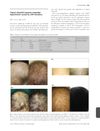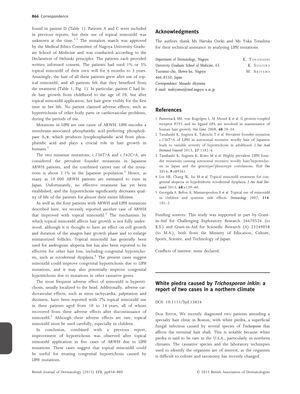TLDR White piedra, a rare fungal infection, was diagnosed in two women in a northern climate.
The document reported two cases of white piedra, a superficial fungal infection caused by *Trichosporon inkin*, in a northern climate, which is rare in the U.S.A. The first patient, a 35-year-old woman, had tan-colored concretions on her scalp hair, and the infection was confirmed through DNA sequencing after initial culture attempts failed. The second patient, a 23-year-old woman, had similar concretions and was diagnosed using a phenotypic kit after 18 days of incubation. She opted for treatment with ketoconazole shampoo and oral itraconazole instead of cutting her hair. The report highlighted the challenges in diagnosing white piedra due to its subtle presentation and the difficulty in culturing the organism, emphasizing the importance of advanced laboratory techniques for accurate identification.
 12 citations
,
June 2012 in “Revista da Sociedade Brasileira de Medicina Tropical”
12 citations
,
June 2012 in “Revista da Sociedade Brasileira de Medicina Tropical” A family had a rare fungal infection called white piedra, identified as Trichosporon inkin.
 28 citations
,
March 2010 in “Clinics in dermatology”
28 citations
,
March 2010 in “Clinics in dermatology” Doctors have known about fungal skin infections for a long time, but only made major progress in understanding and treating them since the mid-1800s.
 12 citations
,
June 2012 in “Revista da Sociedade Brasileira de Medicina Tropical”
12 citations
,
June 2012 in “Revista da Sociedade Brasileira de Medicina Tropical” A family had a rare fungal infection called white piedra, identified as Trichosporon inkin.
 10 citations
,
January 2013 in “International journal of trichology”
10 citations
,
January 2013 in “International journal of trichology” A woman's scalp nodules were successfully treated with antifungal and anti-lice medications, revealing a rare case of mixed piedra infection.
 2 citations
,
August 2021 in “Skin appendage disorders”
2 citations
,
August 2021 in “Skin appendage disorders” White piedra is a rare hair infection treated with oral and topical antifungals.
 11 citations
,
January 2014 in “Indian journal of dermatology, venereology, and leprology”
11 citations
,
January 2014 in “Indian journal of dermatology, venereology, and leprology” Trichosporon inkin and Trichosporon mucoides can cause white piedra on scalp hair.
 7 citations
,
March 2015 in “British Journal of Dermatology”
7 citations
,
March 2015 in “British Journal of Dermatology” Applying minoxidil can help improve hair growth in people with hair loss caused by LIPH gene mutations.






